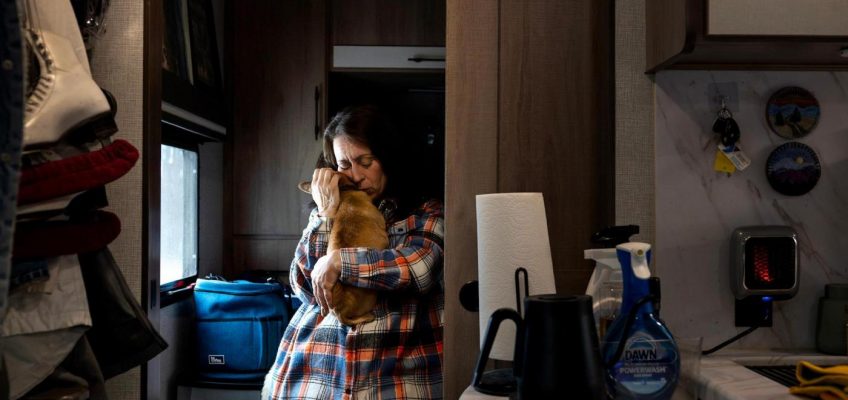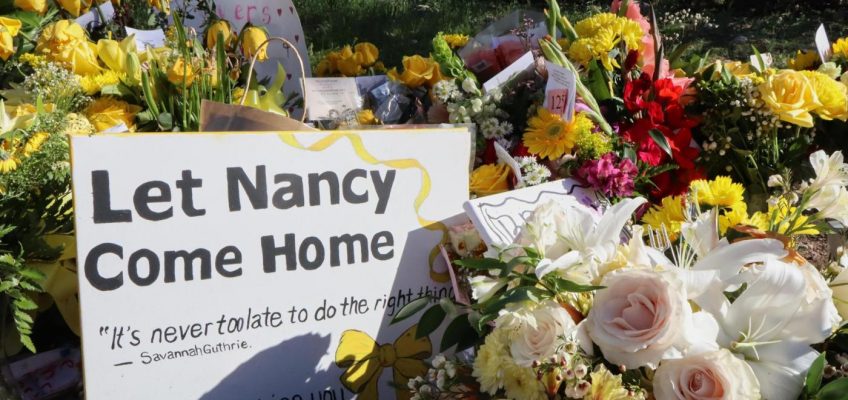By Samantha Liss, Sam Whitehead, KFF Health News
Lori Kelley’s deteriorating vision has made it hard for her to find steady work.
The 59-year-old, who lives in Harrisburg, North Carolina, closed her nonprofit circus arts school last year because she could no longer see well enough to complete paperwork. She then worked making dough at a pizza shop for a bit. Currently, she sorts recyclable materials, including cans and bottles, at a local concert venue. It is her main source of income ― but the work isn’t year-round.
“This place knows me, and this place loves me,” Kelley said of her employer. “I don’t have to explain to this place why I can’t read.”
Kelley, who lives in a camper, survives on less than $10,000 a year. She says that’s possible, in part, because of her Medicaid health coverage, which pays for arthritis and anxiety medications and has enabled doctor visits to manage high blood pressure.
Lori Kelley of Harrisburg, North Carolina, has deteriorating vision that affects her livelihood. Last year, she had to shutter her nonprofit because she couldn’ t see well enough to do paperwork. Under Medicaid’ s new work requirements, Kelley is concerned about losing access to care for her high blood pressure and anxiety. (A.M. Stewart/KFF Health News/TNS)
But she worries about losing that coverage next year, when rules take effect requiring millions of people like Kelley to work, volunteer, attend school, or perform other qualifying activities for at least 80 hours a month.
“I’m scared right now,” she said.
Before the coverage changes were signed into law, Republican lawmakers suggested that young, unemployed men were taking advantage of the government health insurance program that provides coverage to millions of low-income or disabled people. Medicaid is not intended for “29-year-old males sitting on their couches playing video games,” House Speaker Mike Johnson told CNN.
But, in reality, adults ages 50 to 64, particularly women, are likely to be hit hard by the new rules, said Jennifer Tolbert, deputy director of the Program on Medicaid and the Uninsured at KFF, a health information nonprofit that includes KFF Health News. For Kelley and others, the work requirements will create barriers to keeping their coverage, Tolbert said. Many could lose Medicaid as a result, putting their physical and financial health at risk.
Starting next January, some 20 million low-income Americans in 42 states and Washington, D.C., will need to meet the activity requirements to gain or keep Medicaid health coverage.
Lori Kelley worries about Medicaid’ s new work requirements, which may disrupt her treatment for deteriorating eyesight, high blood pressure, and anxiety. (A.M. Stewart/KFF Health News/TNS)
Alabama, Florida, Kansas, Mississippi, South Carolina, Tennessee, Texas, and Wyoming didn’t expand their Medicaid programs to cover additional low-income adults under the Affordable Care Act, so they won’t have to implement the work rules.
The nonpartisan Congressional Budget Office predicts the work rules will result in at least 5 million fewer people with Medicaid coverage over the next decade. Work rules are the largest driver of coverage losses in the GOP budget law, which slashes nearly $1 trillion to offset the costs of tax breaks that mainly benefit the rich and increase border security, critics say.
“We’re talking about saving money at the expense of people’s lives,” said Jane Tavares, a gerontology researcher at the University of Massachusetts Boston. “The work requirement is just a tool to do that.”
Department of Health and Human Services spokesperson Andrew Nixon said requiring “able-bodied adults” to work ensures Medicaid’s “long-term sustainability” while safeguarding it for the vulnerable. Exempt are people with disabilities, caregivers, pregnant and postpartum individuals, veterans with total disabilities, and others facing medical or personal hardship, Nixon told KFF Health News.
Medicaid expansion has provided a lifeline for middle-aged adults who otherwise would lack insurance, according to Georgetown University researchers. Medicaid covers 1 in 5 Americans ages 50 to 64, giving them access to health coverage before they qualify for Medicare at age 65.
Among women on Medicaid, those ages 50 through 64 are more likely to face challenges keeping their coverage than their younger female peers and are likely to have a greater need for health care services, Tolbert said.
These middle-aged women are less likely to be working the required number of hours because many serve as family caregivers or have illnesses that limit their ability to work, Tolbert said.
FDA proposes new system for approving customized drugs and therapies for rare diseases
As the US population ages, more employees are seeking caregiver benefits at work
What is ALS, the disease that killed actor Eric Dane?
End of enhanced Obamacare subsidies puts tribal health lifeline at risk
Nurses and New York hospital system reach a tentative deal to end the city’s largest nursing strike
Tavares and other researchers found that just 8% of the total Medicaid population is considered “able-bodied” and not working. This group consists largely of women who are very poor and have left the workforce to become caretakers. Among this group, 1 in 4 are 50 or older.
“They are not healthy young adults just hanging out,” the researchers stated.
Plus, making it harder for people to maintain Medicaid coverage “may actually undermine their ability to work” because their health problems go untreated, Tolbert said. Regardless, if this group loses coverage, their chronic health conditions will still need to be managed, she said.
Adults often start wrestling with health issues before they’re eligible for Medicare.
If older adults don’t have the means to pay to address health issues before age 65, they’ll ultimately be sicker when they qualify for Medicare, costing the program more money, health policy researchers said.
Many adults in their 50s or early 60s are no longer working because they’re full-time caregivers for children or older family members, said caregiver advocates, who refer to people in the group as “the sandwich generation.”
The GOP budget law does allow some caregivers to be exempted from the Medicaid work rules, but the carve-outs are “very narrow,” said Nicole Jorwic, chief program officer for the group Caring Across Generations.
She worries that people who should qualify for an exemption will fall through the cracks.
“You’re going to see family caregivers getting sicker, continuing to forgo their own care, and then you’re going to see more and more families in crisis situations,” Jorwic said.
Paula Wallace, 63, of Chidester, Arkansas, said she worked most of her adult life and now spends her days helping her husband manage his advanced cirrhosis.
After years of being uninsured, she recently gained coverage through her state’s Medicaid expansion, which means she’ll have to comply with the new work requirements to keep it. But she’s having a hard time seeing how that will be possible.
“With me being his only caregiver, I can’t go out and work away from home,” she said.
Wallace’s husband receives Social Security Disability Insurance, she said, and the law says she should be exempt from the work rules as a full-time caregiver for someone with a disability.
But federal officials have yet to issue specific guidance on how to define that exemption. And experience from Arkansas and Georgia ― the only states to have run Medicaid work programs ― shows that many enrollees struggle to navigate complicated benefits systems.
“I’m very concerned,” Wallace said.
©2026 KFF Health News. Distributed by Tribune Content Agency, LLC.




